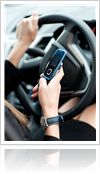
In America, our fast-paced lifestyles call for massive amounts of multitasking. Thankfully, technology equips us to get a lot more done on-the-go. Smartphones give us instant access to our e-mail, contacts, social networks, internet, photo sharing websites, stocks, weather, and video-sharing accounts with just a couple of taps. While this instant information is helpful and beneficial in most circumstances, it can wreak havoc on our driving.
In fact, studies are proving that people who text, check e-mail, or play games on their phones while driving are a greater danger to society than drunk drivers. In an AAA study, researchers confirmed that 61 percent of teens admit to risky driving habits, and 46 percent of those teens say that they regularly text while driving. Though teens are more prone to text and drive than adults, more and more grown-ups are also falling victim to the temptation of driving and texting. According to a recent poll, 18 percent of all accidents that occur are due to a cell phone distraction. An unexpected drift or a car in a blind spot is easy to miss when the driver is busy checking up on e-mail, reading a blog, or texting friends.
Even if you are fortunate enough to avoid an accident, staring at a smartphone while driving can result in plenty of swerving. It's difficult to keep an eye on the road and an eye on the cell phone screen at the same time. The majority of drivers admit that they will drift in their lane and swerve back into place when they are trying to text and drive simultaneously. This can make a perfectly sober driver look like a DUI suspect.
It is the citizen's responsibility to report suspicious drivers on the freeway, but they don't always get it right. A person who on his or her cell phone is just as prone to veer in and out of traffic lanes and appear distracted. One study states that driving while using a smartphone reduces the amount of brain activity devoted to driving by 37 percent. The University of Utah found that using a cell phone while driving delays a driver's reactions as much as having a blood-alcohol concentration at the legal limit of .08 percent. At 55 mph, even 3 seconds of distraction—the rough amount of time it takes to look at a text—amounts to driving a football field without looking at the road.
DUI vs. Driving While Texting: Which Is Worse?
Car & Driver Magazine recently did a study to see which was the more dangerous: driving under the influence or driving while fiddling with a phone. In their experiment, the men rigged a car with a red light to alert drivers when to brake, and tested how long it took for drivers to slow to a stop under certain impairments. A sober and unimpaired driver took .54 seconds to brake, while a legally drunk driver moved an extra 4 feet before slowing down. A teen on her cell phone took an extra
70 feet to react to the red light.
Forty-seven states have banned the practice of toying with a smartphone while behind the wheel, and 43 of them allow officers to pull you over solely for texting. While the debate rages as to which is worse between drunk drivers or texting drivers, it is prudent to avoid committing either offense. Safe driving will keep you away from the threat of an accident and free of accusations and convictions.